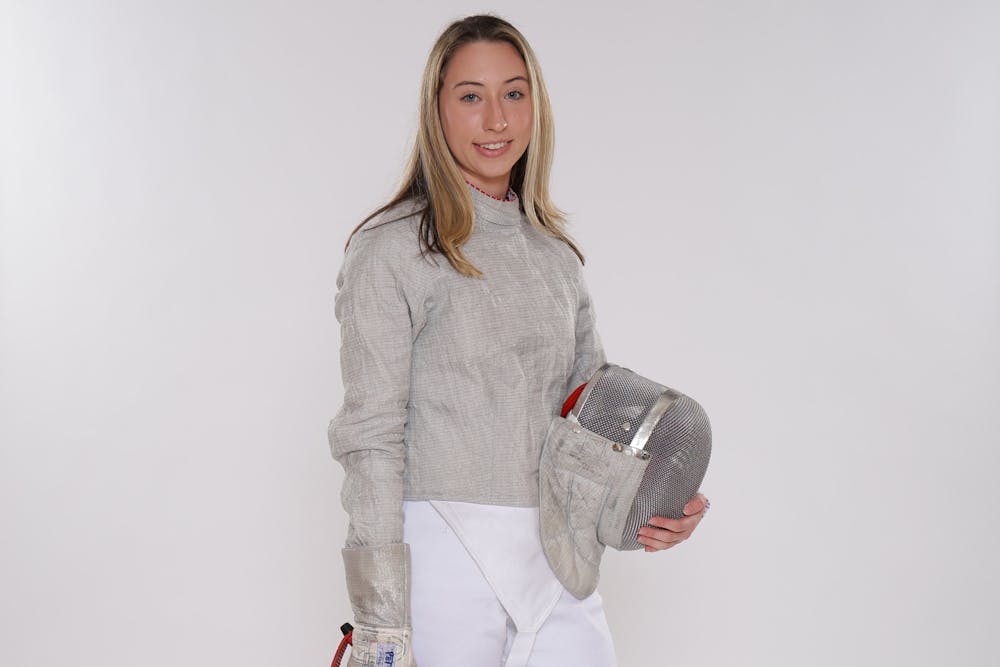For some athletes, success can take time. But for freshman fencer Leah Blum, that has not been true.
So far, just a few months into her Quaker career, Blum has already won the gold medal in sabre at two events — the Elite Invitational and the Temple Open. Blum demonstrated her blend of skill, strategy, and mental fortitude at the Temple Open, winning the sabre event in her first collegiate competition.
"Going into it, I was a little nervous because in my first competition fencing for Penn. I didn't know what to expect," Blum said. "I just tried to stay on top of my bouts, winning and not worry[ing] about the mistakes I made in the past bouts that I fenced."
But even though she's quickly found success as a Quaker, Blum excelled in various athletic pursuits for much of her childhood.
Blum's introduction to fencing was influenced by her father, who also fenced at the collegiate level. She started her journey at the Boston Fencing Club during her offseasons from soccer. But over time, these roles reversed as Blum began fencing more and more, influenced by French fencer Manon Brunet as she developed her technique. In the end, it was clear where she would end up.
"He fenced at Penn, which is something I wanted to continue," Blum said of her father.
Blum's transition to college-level fencing at Penn meant a change in competition level and a shift in team dynamics and culture. In contrast to high school's more individualistic competition formats, which saw Blum travel across the country on a monthly basis for national tournaments, college fencing has more of a team atmosphere, which Blum is grateful for.
"In college, we fence more as a team," Blum said. "We all support each other, fencing for a common goal. Losing in college isn't the end of the world. Teammates are there to support you."
RELATED:
Penn fencing looks strong for 2023-24 season after medaling seven times at Temple Open
15 questions with ... Josh Johnson, a Penn sprint football freshman
The team has fun together, often participating in events beyond the fencing piste, including frequent team dinners. But this doesn't mean they don't work hard. Blum recounted all the practices on Mondays through Fridays, with twice-weekly lifts and an overall program to enhance both physical fitness and technical skills.
Coach Andy Ma has been instrumental in Blum's development. His approach differs markedly from her earlier training, with a focus on continuous mentoring and tactical advice during bouts.
"Coach Ma has been super helpful. He's always there, giving us advice and helping us improve," Blum said, appreciating his hands-on guidance.
Blum's fencing strategy has evolved to focus on more mental resilience and adaptability, especially in longer bouts. She attributes this as a key factor to her competitive edge. Blum's fencing technique leans toward mental strategy rather than speed, differentiating women's fencing from the speed and strength-focused sessions she has had with men fencers.
"I've learned to stay mentally locked in, resetting during each bout," Blum said.
Reflecting on her first semester at Penn, Blum noted the differences and challenges compared to high school. The strong team dynamic makes college fencing more engaging and fun. Balancing academics with athletics and a social life was initially challenging. Blum aims to contribute to team success and foster team spirit at Penn, setting high competitive goals for herself and the team.
"I want to do well in fencing, make NCAA [Championships], go to Ivy [Championships, and] win Ivy [Championships], and hopefully, this year, we have a chance," she said. "I just want people to know that I worked hard and wanted the team to do well. I'm all about the team spirit."









